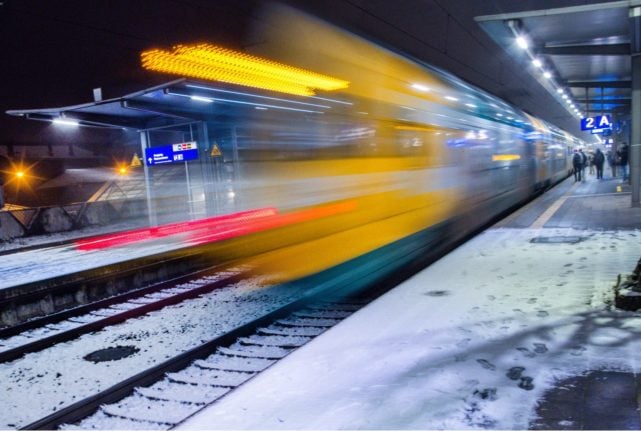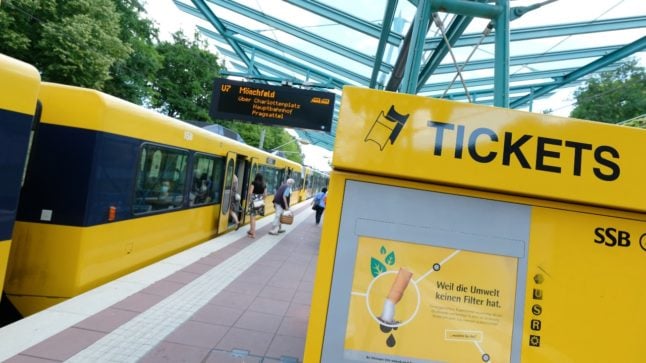What’s happening?
For months, financing rows between the central and state governments have delayed the introduction of the ‘Deutschlandticket’ – the €49 travel card that will enable customers to travel all over Germany on local and regional transport for a fixed monthly price.
The impetus for the new offer followed from the hugely popular €9 ticket that was on sale for three months last summer which offered many of the same travel conditions.
But while the €9 ticket was a short-term measure aimed at relieving the strain of spiralling living costs last year, the €49 ticket is intended to be a longer-term initiative, which will be funded by both the state and regional governments.
READ ALSO: ‘Deutschlandticket’: What you need to know about Germany’s new travel offer
As a result, the €49 ticket has been subject to drawn-out debates on financing and technical details between the federal and state governments and the launch date has been repeatedly pushed back from an initially intended start in January.
While the announcement that the ticket will launch on May 1st – and go on sale on April 3rd – is the clearest indication yet of an intended start date, it has prompted criticism from some local officials and there are still a couple of hurdles that could stand in the way.
Why do some people want to delay the start date?
Following the announcement of the May 1st launch date for the ‘Deutschlandticket’, representatives from local districts have criticised the start date as being too soon, fearing problems “on all fronts”.
Reinhard Sager, president of the German County Association, told the Frankfurter Allgemeine Zeitung that he considers the launch date to be a “bad idea”.

“For the time being, there will be bumps all over Germany,” he said. Sager criticised federal politicians for bringing about an “absurd situation” in which the price for the ticket was announced before the details were ironed out. He also said that a cheap ticket would not solve the existing problems with local transport.
READ ALSO: Start date for Germany’s €49 ticket unclear as officials row over details
“That was already the mistake of the €9 ticket. What good is a €9 ticket for a bus that doesn’t run? Now we’re trying a €49 ticket. But the bus still doesn’t run in many areas,” Sager said.
What could delay the ticket?
Before the ticket can go on sale, the EU Commission still has to give its approval. As the federal government is compensating transport companies for the loss of revenue caused by the €49 ticket to the tune of billions of euros, the project involves questions of state aid law at the EU level. There is still a small chance, therefore, that the EU Commission could overturn the plans.
There are also still open discussions in Germany as well – especially on the question of whether the ticket should be offered only in paper form.
Following the agreement on Friday, Bavaria’s transport minister Christian Bernreiter (CSU) announced that he wants the ticket to be available as a traditional and non-digital ticket, at least for the time being.
READ ALSO: How employees in Germany could get a discount on the €49 ticket
“We will not be bullied but will launch the ‘Deutschlandticket’ in such a way that everyone can use it, even if they don’t have a smartphone,” Bernreiter said on Friday.
Federal Transport Minister Volker Wissing (FDP), however, favours a ticket that is only available digitally.
Another potential stalling point is the fact that the ticket would need to be approved as a new fare by the supervisory boards of each of Germany’s transport companies – a procedure that would require “hundreds of approvals” – according to North Rhine-Westphalia’s Transport Minister Oliver Krischer (Greens), who chairs the Transport Ministers’ Conference.
There are also ongoing uncertainties about discounted versions of the ticket.
Student representatives from all over Germany are now calling for a ‘€29 education ticket’ for students, schoolchildren, trainees and people doing voluntary service. A paper published by the General Students’ Committee of the University of Oldenburg stated that many students could not afford the planned €49 ticket. Bavaria, among other states, has said that it plans to introduce such a €29 ticket for students and trainees.
It’s also not yet clear how discounted tickets for those on benefits will work. The Greens in North Rhine-Westphalia, for example, are now calling for an additional social fare, arguing that €49 a month is still too much for many people.
Green state parliamentary group leader Verena Schäffer said that there is still a need for an additional offer “so that especially people who receive social benefits do not fall by the wayside”.



 Please whitelist us to continue reading.
Please whitelist us to continue reading.
Member comments